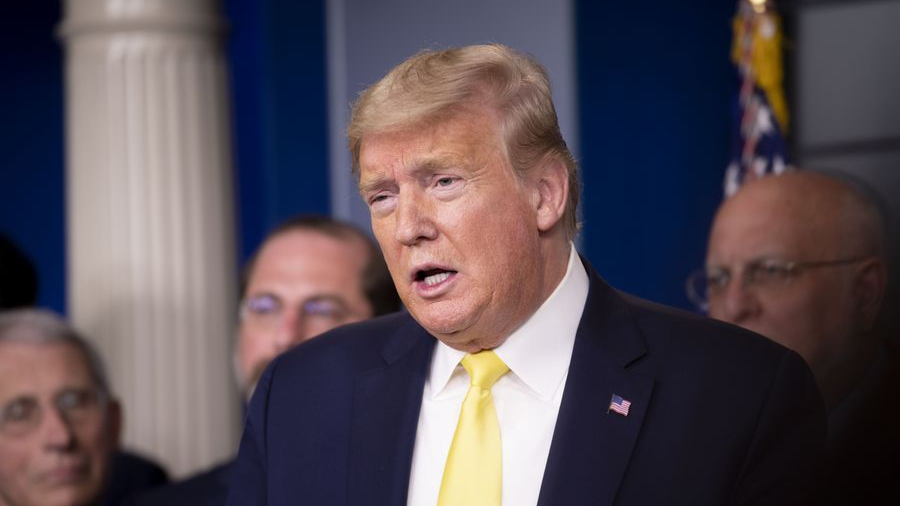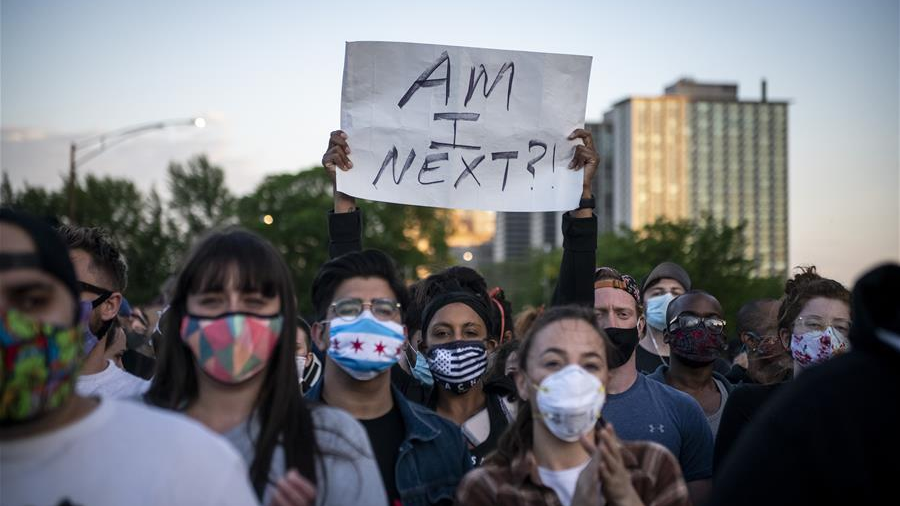
U.S. President Donald Trump attends a press conference on the COVID-19 at the White House in Washington, D.C., U.S., March 9, 2020. /Xinhua
U.S. President Donald Trump attends a press conference on the COVID-19 at the White House in Washington, D.C., U.S., March 9, 2020. /Xinhua
Editor's note: William Jones is the Washington bureau chief for Executive Intelligence Review and a non-resident fellow of Chongyang Institute for Financial Studies, Renmin University of China. The article reflects the author's opinions and not necessarily the views of CGTN.
U.S. President Trump on June 16 signed an executive order mandating a thorough reform of the local and state police forces. While the federal government does not control law enforcement on the state and local level, these being left to the states, the federal government can and does set the requirement to which the states and local jurisdictions must adhere.
The states and localities are also recipients of a good deal of federal funding for their law enforcement needs. Had he done this before the killing of the African-American George Floyd, this could have played a major role in preventing George Floyd's death, and the subsequent upsurge of emotions among the general public over his death from an over-zealous police "choke-hold," which is now forbidden to be used by the executive order.
Very few people have expressed much reaction to the president's measure, many considering it too little and too late. And so the demonstrations will continue. And at this point, as we are approaching the presidential elections, they have become an important element in the Democratic campaign to unseat Trump.
We have seen leading Democratic politicos like Speaker Nancy Pelosi and Senate Democratic Leader Chuck Schumer, suddenly draping themselves in an African shawl and "taking the knee", a genuflection which has become a trade-mark of the Black Lives Matter movement.
Not a little hypocrisy by those who have largely been in charge of the country and bear a significant responsibility for the conditions against which many people are now reacting by demonstrating.
And while there is good reason for people to be upset at how little progress has been made in the battle for civil rights for African-Americans since the height of the civil rights movement in the 1960s, the demonstrations have also been turned violent by the more radical "Antifa" groups who simply want to overthrow the entire system.
And without further measures by the Trump administration to specifically address the problems of the African-American community, these demonstrations will simply become a part of the Democrats' ongoing "coup" against the president, which started the day he took office, and which they will use to influence the upcoming elections.

A protest in the Uptown neighborhood of Chicago, U.S., June 1, 2020. /Xinhua
A protest in the Uptown neighborhood of Chicago, U.S., June 1, 2020. /Xinhua
While President Trump did have a program that would have benefited the black community by creating jobs and building needed infrastructure, he never really focused specifically on the needs of the black community.
True, before the COVID-19 outbreak, employment had increased, including among African-Americans. But the pandemic knocked the bottom out of that.
And, again, it was more a "trickle-down" effect rather than a focused measure to help alleviate the endemic poverty in the country, which has been most prevalent in the inner cities where the black ghettoes are located.
And the compromises he has had to make in order to maintain his "base" and his tenuous relationship to certain elements in the Republican party, of which he was never a member, have often led to him turning a cold shoulder to the needs of the African-American community.
Can President Trump turn this around? He will certainly have to go further than his executive order. While maintaining necessary funding for the police, he must return as much as possible, to the program he won on in 2016.
While simply letting the economy "open up" has already proven a costly endeavor with death tolls rising in many states, he should conduct a "phased" opening up which takes full regard to the fact that the virus is still very much with us.
More specifically, he should mandate funding for a major infrastructure program, which could begin even with the restrictions on COVID-19. He may have to run a deficit and take some heat from some of his Republican "lukewarm" supporters.
But rather let them complain than lose the "silent majority" he had in 2016. And I suspect that many of that "silent majority" are also t concerned about the brutal death of George Floyd, and may even be out demonstrating.
And more profoundly, he has got to give speeches and take concrete measures, which will show a genuine attempt to unite the country in this unsettled situation.
And while the pundits and the media are totally against him and against a continued Trump administration, he does have his "bully pulpit" from which he can convey his messages.
But it must be a message of hope for the nation combined with concrete steps to improve the lot of the majority of people, white and black. And he should avoid for the gimmick of trying to get elected on "blaming China" for the dire situation the country finds itself in.
Only the anti-China political wonks will applaud that message, but they don't represent the majority he needs to win an election.
(If you want to contribute and have specific expertise, please contact us at opinions@cgtn.com.)